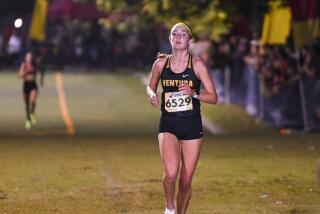CIF Defends Decision to Cancel State Meet
Dan Doherty, the girls’ track and field coach at Pearl River High in New York, heard that the finals of the California state high school track championships had been canceled because of an inch of rainfall.
“So when are they going to reschedule it?” Doherty asked.
When told the meet would not be rescheduled, Doherty was dumbfounded.
As a member of the organizing committee for the New York state girls’ track championships, Doherty could not fathom canceling a meet of such importance because of inclement weather.
“It basically poured the whole time during the first day of last year’s state meet,” Doherty said.
“But we never thought about canceling the meet. I would have to be on my deathbed before I would think about canceling the state meet.”
Members of organizing committees in other states, such as Texas, Oregon and Colorado, also expressed surprise at the decision to cancel the finals of the California state championships, which were scheduled to start at 3 p.m. Saturday at Cerritos College.
Thomas Byrnes, the CIF commissioner, decided to cancel the meet at 1:45 p.m. after reviewing a recommendation by a five-member track advisory committee which said that “a substantial number of adverse conditions existed that would place in jeopardy the health and safety of the competing student athletes.”
The CIF decided Tuesday to award all state finalists special medals of participation.
Officials from other states agreed that they would never cancel their state championships because of inclement weather and outlined contingency plans for extremely adverse conditions. California coaches were universally critical of state officials because they had no contingency plan in place.
Byrnes was sticking to his guns.
“If I had to do it all over again, I would make the same decision,” he said. “I made a decision I could live with, and that is why I haven’t been second-guessing myself.”
States outside of California only postpone their meets for the most adverse weather conditions.
Last year’s Texas state meet was run during a storm that deposited a foot of rain on the Austin area over a two-day period, and although the meet was delayed for three hours because of tornado sightings and lightning, it was completed at 1:15 in the morning.
Last month’s Oregon state championships also were staged in a steady rain, and intense thunderstorms interrupted the finals of the Colorado state meet for a half-hour last month before a rainstorm abated and water was drained off the track.
“We evaluate things on an event-by-event basis,” said Bert Borgmann, an administrator with the Colorado High School Activities Assn. “When we get heavy rains or severe thunderstorms, we wait until things clear up and proceed when we can. In some years, we’ve even delayed the pole vault for a day so the pit could dry out. But we would never cancel the entire meet.”
Jim Eckman, the track coach at Yreka High near the Oregon border, said that nearly half of his team’s meets this season were run in the rain.
“That’s why we were so shocked when they canceled the state meet,” Eckman said. “To us, rain is not a big deal.”
Thousand Oaks senior Marion Jones, who was favored to win an unprecedented seventh, eighth and ninth individual titles in the girls’ 100 and 200 meters and the long jump, expressed similar sentiments.
“I’ve run in rain before,” she said. “If they say athletes are at risk, they have to take into consideration every meet. They at least could wait a few hours. This is an all-weather track.”
The cancellation further enraged athletes and coaches because the meet was not scheduled to start until 3 and it stopped raining by 2.
The sun came out shortly thereafter and by 4 o’clock, weather conditions were “ideal” and the track was dry, according to coaches such as Bill Duley of Agoura, Dennis Riedmiller of Camarillo and Greg Switzer of Hoover. “I think that was the most idiotic decision they could have made,” Duley said. “I just can’t understand why you wouldn’t want to wait until the very last minute to make a decision of that magnitude.”
Byrnes’ decision affected over 320 athletes from 168 schools.
Dean Crowley, the associate commissioner of the Southern Section, was one of five members of the advisory committee that called for the cancellation. He added that state rules prohibit high school athletes from competing on Sunday, and postponing the meet was logistically impossible because many coaches and athletes had airline and hotel reservations that could not be changed.
All of which leads to two basic questions: Did Byrnes & Co. cancel the meet because they feared potential lawsuits if athletes were injured? Why was there no contingency plan in case of rain?
Byrnes said the possibility of legal action was not a factor in his decision--only the safety of the athletes--but Crowley admitted that “any time you put a kid at an unnecessary risk and he gets injured, you could have problems.”
Thousand Oaks girls’ Coach Art Green echoed the feelings of many coaches when he asked if the conditions at Cerritos were truly unsafe why there weren’t plans in place that could have moved the meet to another stadium such as Long Beach City College or UCLA.
And couldn’t the CIF waive the rule against competing on Sundays in order to get the meet in?
“We had no backup plan because we’ve never had this kind of a problem before,” Byrnes said. “But that is . . . something we will make sure we do next year.”
Some states, such as New York, do not have set contingency plans, either, but as Doherty says, “We’ve never seriously considered canceling the state meet. The weather has never been that bad.”
More to Read
Get our high school sports newsletter
Prep Rally is devoted to the SoCal high school sports experience, bringing you scores, stories and a behind-the-scenes look at what makes prep sports so popular.
You may occasionally receive promotional content from the Los Angeles Times.






